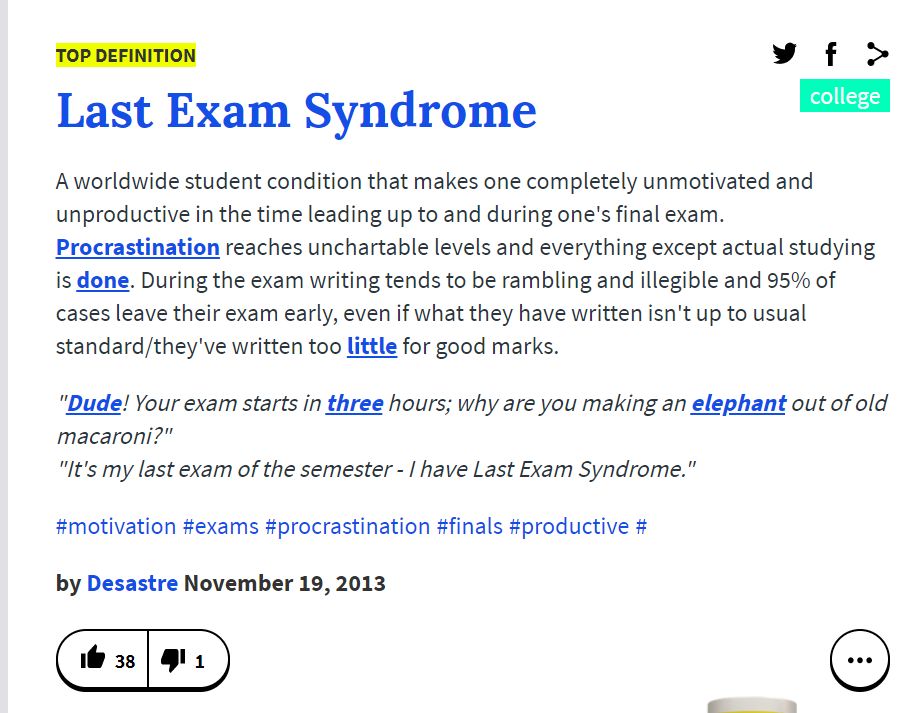Last Exam Syndrome: A Personal Experience
Mar 28, 2019 • 1959 views

“It’s almost done... I’m almost there... tomorrow... tomorrow is the day...the last day of exam...and them, I’m free...free! free! FREE!”
Perhaps you relate to the above monologue I engaged in on the day before the last exam. Perhaps, like me, engaging in such a monologue is all you did when you were suppose to be studying on the day before your last exam. If you did then welcome to the club! You have come to the right place. In this article I will talk about the universal, yet often unacknowledged student’s phenomenon of last exam syndrome (LES) based mostly on my personal experience. I will also give you some tips so that you do not end up like the failure that I am.
What is Last Exam Syndrome?

The name itself, as you might have guessed already, is self explanatory and reveals a lot about the syndrome. Urban Dictionary defines last exam syndrome as “A worldwide student condition that makes one completely unmotivated and unproductive in the time leading up to and during one'sfinal exam. Procrastination reaches unchartable levels and everything except actual studying is done. During the exam writing tends to beramblingandillegibleand 95% of cases leave their exam early, even if what they have written isn't up to usual standard/they've written too little for good marks.” Although it is a universal student condition, actual and reliable sources of information about this condition are few. However, it must be mentioned that it is not a legitimate syndrome (although I wish it was so I had a real excuse for my laziness). It is just a phenomenon that students from all over the world relate to. But why should that stop us from delving deeper into the topic?
Stages of Last Exam Syndrome
Last exam syndrome is not just laziness or procrastination. It happens when a student is under the illusion that the exam has ended and holidays have started. In the initial stages, the student seems to be brimming with happiness over the fact that after the following day, he or she will be free. He or she daydreams about all the things he or she will be able to do once the exams are over. His or her cognition is too clouded with his or her emotions to study. This implies that he or she is too happy to concentrate. Even if the student tries to study, he or she cannot concentrate. Several distractions, most prominently social media, also come into play, and are given in to. If these distractions are ignored, they become even more powerful.
In the next stage, when only a few hours are left for the student to study, the student starts getting anxious and stressed and starts to panic because he or she realises that he or she has too less time to study. While some cope with this effectively and start studying immediately, others adopt a variety of maladaptive coping techniques like venting and/or over-sharingon the internet, stress eating, playing video games, making and sharing memes (like I did) and so on. They start preparing themselves for the probable tragedy that they are going to face the next day.
In the last stage, that is, just a few hours before the exam, students who are severe cases of last exam syndrome may react in two ways; in the first way, they try to revise whatever they can so that they can write at least some thing in the exam, while in the other way, they give up completely and surrender to luck. One will see the second type chilling around freely while on the inside, they are anything but relaxed.

Once the exam starts, these students may seem to continue to appear relaxed and write less than others as most of these people have already surrendered to the mercy of luck. Many try to remember things they had studied at some point and may even do well like that. Others give up completely and may even go to sleep. Even the ones who are prepared feel a reluctance to write anymore and handwriting and quality of answers seem to deteriorate sharply.
After the exams are over, most students who have not done too well feel a lot of guilt and remorse and may even engage in counter-factual thinking. This prevents them from enjoying their holidays. Some of them may ignore these feelings and relax but it remains at the back of their mind, preventing them from actually enjoying them. However, fact remains that what has happened, has happened and nothing can change it.
Tips
·Revise earlier so that even if you don’t revise much before the exam, you remember at least something to
·Recognise it as it hits you but do not use it as an excuse.
·Try to keep everything out of your mind so that you can concentrate.
·Switch off your phone.
·Whenever you feel distracted, write your distraction down on a paper and continue studying.
·Reward yourself when you have successfully completed revising a portion and take a break.
·Write in the exam. His also prevents you from panicking.
·Practice adaptive coping techniques like deep breathing or rhythmic breathing.
·Don’t think about the next day. Stay in the moment.
Conclusion
Last exam syndrome is a universal student phenomenon and that most students relate to. However, as I mentioned earlier, it is not a legitimate syndrome, disorder or condition. Do not use it as an excuse to justify your laziness. However, if you’re too late then remember, don’t dwell on the past, learn from it and move on.
By
Iswaree Sarkar
P.s: facts presented here have no scientific validity and have must be used for the purpose of humour only.
